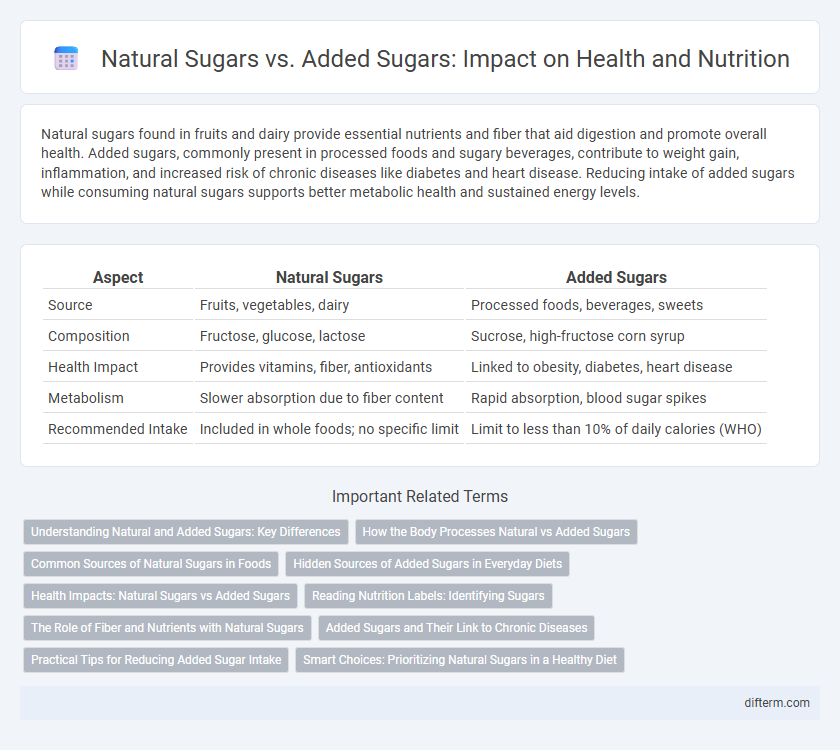Natural sugars found in fruits and dairy provide essential nutrients and fiber that aid digestion and promote overall health. Added sugars, commonly present in processed foods and sugary beverages, contribute to weight gain, inflammation, and increased risk of chronic diseases like diabetes and heart disease. Reducing intake of added sugars while consuming natural sugars supports better metabolic health and sustained energy levels.
Table of Comparison
| Aspect | Natural Sugars | Added Sugars |
|---|---|---|
| Source | Fruits, vegetables, dairy | Processed foods, beverages, sweets |
| Composition | Fructose, glucose, lactose | Sucrose, high-fructose corn syrup |
| Health Impact | Provides vitamins, fiber, antioxidants | Linked to obesity, diabetes, heart disease |
| Metabolism | Slower absorption due to fiber content | Rapid absorption, blood sugar spikes |
| Recommended Intake | Included in whole foods; no specific limit | Limit to less than 10% of daily calories (WHO) |
Understanding Natural and Added Sugars: Key Differences
Natural sugars, found in fruits, vegetables, and dairy, provide essential nutrients like vitamins, minerals, and fiber, supporting overall health. Added sugars, commonly found in processed foods and sugary beverages, contribute empty calories and increase the risk of obesity, diabetes, and heart disease. Differentiating between these sugars helps consumers make informed dietary choices to maintain balanced blood sugar levels and promote long-term wellness.
How the Body Processes Natural vs Added Sugars
Natural sugars found in whole fruits and vegetables are processed more slowly by the body due to the presence of fiber, which aids in regulating blood sugar levels. Added sugars, commonly found in processed foods and sugary beverages, are rapidly absorbed, causing spikes in blood glucose and insulin levels. This rapid absorption can contribute to increased risk of insulin resistance, obesity, and type 2 diabetes.
Common Sources of Natural Sugars in Foods
Common sources of natural sugars include fruits, vegetables, dairy products, and honey, which provide essential nutrients alongside fructose and lactose. These natural sugars are often accompanied by fiber, vitamins, and minerals that contribute to overall health and digestion. Consuming natural sugars from whole foods supports energy levels without the negative effects linked to high intake of added sugars found in processed foods and sugary beverages.
Hidden Sources of Added Sugars in Everyday Diets
Hidden sources of added sugars commonly found in everyday diets include flavored yogurts, salad dressings, and breakfast cereals, which often contain high sugar content despite their healthy appearance. Beverages like sodas, fruit juices, and energy drinks also contribute significantly to added sugar intake, increasing risks of obesity, diabetes, and heart disease. Recognizing these hidden sugars and reading nutrition labels carefully can help reduce excessive consumption and promote better overall health.
Health Impacts: Natural Sugars vs Added Sugars
Natural sugars found in fruits and dairy provide essential nutrients and are metabolized more slowly, reducing the risk of blood sugar spikes. Added sugars, prevalent in processed foods and sugary beverages, contribute to obesity, insulin resistance, and increased risk of type 2 diabetes and cardiovascular disease. Limiting added sugar intake is crucial for maintaining metabolic health and preventing chronic conditions.
Reading Nutrition Labels: Identifying Sugars
Understanding nutrition labels is essential for distinguishing natural sugars from added sugars, as the former occur naturally in fruits, vegetables, and dairy, while the latter are incorporated during processing or preparation. Look for terms like sucrose, glucose, fructose, corn syrup, and high-fructose corn syrup to identify added sugars hidden in ingredients lists. Monitoring the "Total Sugars" and "Added Sugars" sections on nutrition facts panels helps manage intake and supports healthier dietary choices.
The Role of Fiber and Nutrients with Natural Sugars
Natural sugars, found in whole fruits and vegetables, come bundled with fiber, vitamins, and minerals that aid digestion and regulate blood sugar levels. The fiber in these foods slows sugar absorption, preventing spikes in insulin and promoting satiety. In contrast, added sugars lack these essential nutrients and fiber, often leading to rapid blood sugar increases and contributing to metabolic health issues.
Added Sugars and Their Link to Chronic Diseases
Added sugars, commonly found in processed foods and sugary beverages, significantly contribute to the development of chronic diseases such as obesity, type 2 diabetes, and cardiovascular disease. Excessive intake of added sugars leads to insulin resistance, inflammation, and increased triglyceride levels, all of which are critical risk factors for metabolic syndrome. Reducing added sugar consumption is essential for managing blood glucose levels and improving overall long-term health outcomes.
Practical Tips for Reducing Added Sugar Intake
To reduce added sugar intake, prioritize whole fruits as natural sugar sources instead of processed snacks or sugary beverages. Read nutrition labels carefully to identify hidden sugars listed as high fructose corn syrup, sucrose, or dextrose, and opt for products with little to no added sugars. Incorporate healthier alternatives like fresh fruit, plain yogurt, or nuts into your diet to satisfy sweet cravings without excess added sugars.
Smart Choices: Prioritizing Natural Sugars in a Healthy Diet
Natural sugars found in fruits, vegetables, and dairy provide essential nutrients such as fiber, vitamins, and minerals that support metabolic health. Added sugars, commonly present in processed foods and sugary beverages, contribute to excess calorie intake and increased risk of obesity, type 2 diabetes, and cardiovascular disease. Prioritizing natural sugars while limiting added sugar consumption promotes balanced blood glucose levels and overall well-being.
Natural Sugars vs Added Sugars Infographic

 difterm.com
difterm.com